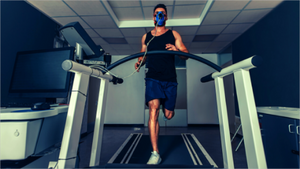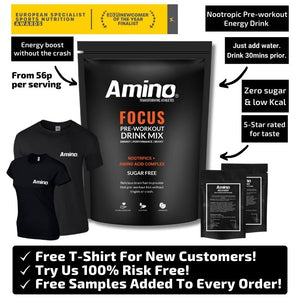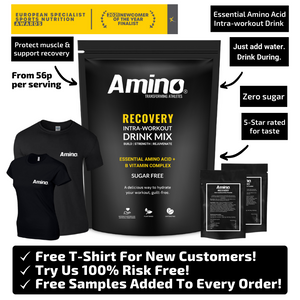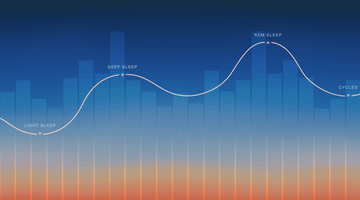Dreading your next workout because your last one still lingers? Legs screaming, weights feeling like anvils, and fatigue clinging on like a shadow? You're not alone. This performance plateau is often caused by neglecting recovery – the silent partner of peak performance.
Here at Amino, we champion the "recover faster, train harder" motto. But what exactly is recovery in the fitness world, and how can you unlock its potential? Before diving into our secret recovery hacks, let's break down the science behind getting back to your top game.
The basics of recovery
Exercise is stressful
When you exercise, you’re putting your body under stress, disturbing its normal state. After your body experiences a stressor, whether it be from weight lifting, biking, boxing, running, etc. it needs time to repair and replenish. In this “recovery" time the body responds by adapting to cope with a larger training load next time. This is called super-compensation, because when the body’s energy, muscular and cardiovascular systems rebuild, they make themselves stronger and more capable than before the training took place. However, the body needs to be allowed the time and resources (sleep, good nutrition, hydration) to build itself back up properly.
Whilst on the subject of stress it is also important to be aware that stress can come from multiple sources – it can be physical e.g. from training intensively, or it can come from chemical sources such as poor nutrition or too much alcohol and also from mental sources such as work or relationship stress. If the total amount of stress gets too much, combined with too little (or ineffective) recovery, the downwards spiral towards overtraining begins.
Rate of recovery can be influenced
As we discussed above, training, especially High-Intensity Training (HIT) is stressful, and deliberately so, as it provides a powerful stimulus for adaptation and improving your strength and fitness. This stressed state of the body persists for many hours, or sometimes days after the training stimulus has been applied. The rate or amount of recovery depends on a number of factors including: quality of sleep (especially slow-wave sleep); nutrition; and the level of training to which the person is accustomed. Whilst the body is stressed, the sympathetic ‘fight or flight’ branch of the nervous system is more active, and the parasympathetic 'rest and digest' branch is less active, but balance is gradually restored during recovery, eventually rising to a level above where it started, in line with the effect of super-compensation.
Hormonal balance should be restored
When it comes to your hormones, stress is stress – your body does not differentiate between good stress (exercise) and not-so-good stress (mental). Depending on the duration and intensity of your workout, the body releases variable amounts of these stress hormones, like cortisol, as well as feel-good hormones, endorphins. These feel-good hormones, enhance your mood and put a spring in your step. Chronically working out at too high of an intensity or for too long or both leads to diminishing returns in performance, as well as overall health and wellbeing unless your recovery is effectively managed.
Simple Steps to Optimise Exercise Recovery
Here are simple things you can do right now to help boost your recovery and a couple biohacks you can experiment with that can take your recovery to an even higher level.
1. EAT WELL
Not something we need to tell you but we do often get asked about pre and post-workout fuel. A simple rule of thumb for us is to have some combination of protein and fat PRE-WORKOUT and some combination of protein and carbohydrate POST-WORKOUT.
However, we know timing can be an issue as life gets in the way and you may not be in the mood for food or heavy protein shake in around you workout. Plus protein takes time to digest before your muscle reaps the benefits. Hence, taking an EAA product like Amino Recovery during your workout is a great alternative way to get your essential amino acids found in protein.
2. GO TO BED
Sleep is not just about the quantity of sleep you get, it’s the quality.
-
Get to bed by 10pm or as many hours before midnight that you can manage.
-
Monitor your light exposure in the evening - think relaxing ambient low lighting.
-
Ditch the electronics at least an hour before bed.
-
Blackout your room as best as possible - cover-up and smalls lights from alarm clocks, air filters or AC units and invest in some good blackout curtains or shades if street lights.
3. KEEP MOVING
Low-intensity movement can speed up recovery and decrease muscle soreness.
In the days following your high-intensity workout, go for a longer walk, gentle hikes, a yoga class, swimming or any other low-intensity activity you prefer to help your muscles recover optimally.
Next Level Recovery Biohacks
If you've already grasped the basics of recovery then perhaps the following 3 biohacks might work for you.
TAKE A REGULAR SAUNA
Who doesn't love a sauna, not only does it give us all the warm, happy feelings but it’s one of the most powerful detox and recovery biohacks available.
Sauna increases blood flow to the skeletal muscles, which helps to keep them fueled with glucose, amino acids, fatty acids, and oxygen, while removing by-products of metabolic processes such as lactic acid and calcium ions.
Check out some Sauna Science from Ben Greenfield Fitness
Don't have access to a Sauna? Then incorporate a contrast shower (hot/cold) or a cold bath into your weekly routine.
INCREASE MAGNESIUM INTAKE
Increase magnesium intake through soaks, spray, supplements or nutritionally.
This essential mineral regulates biochemical reactions in the body such as protein synthesis, muscle and nerve functions like contraction, relaxation and building, also blood glucose and blood pressure. It is also involved with fat synthesis, oxygen uptake in the cells, electrolyte balance and ATP metabolism which is the energy currency of our bodies. The benefits include but are not limited to: Helping to regulate sleep, lowering inflammation, rebuilding muscle tissue, relaxing the nervous system to help lower stress levels, neutralizing stomach acid and making bowel movements regular; enhancing cardiovascular efficiency and elevating muscle strength.
EXERCISE WITH OXYGEN THERAPY (EWOT)
Many people have heard of hyperbaric oxygen therapy before as a method for supporting health conditions, detoxifying the body, reducing inflammation and improving cellular health. But not many people have heard of or understand “exercise with oxygen therapy.” Very simply put, it’s similar to hyperbaric treatment but for people who are able to exercise, it’s a much more efficient and effective method to achieve the same results (and a lot cheaper).
Here is a guide to exercise with Oxygen therapy from Ben Greenfield Fitness
In summary
You are your best test subject. Try mini experiments on yourself to see what works best for you. Everyone will be different in how they react. Become the expert of your own body. What are some of the things you have tried in the past that improved your recovery? What are you going to experiment with in the future to see how much your performance benefits?







